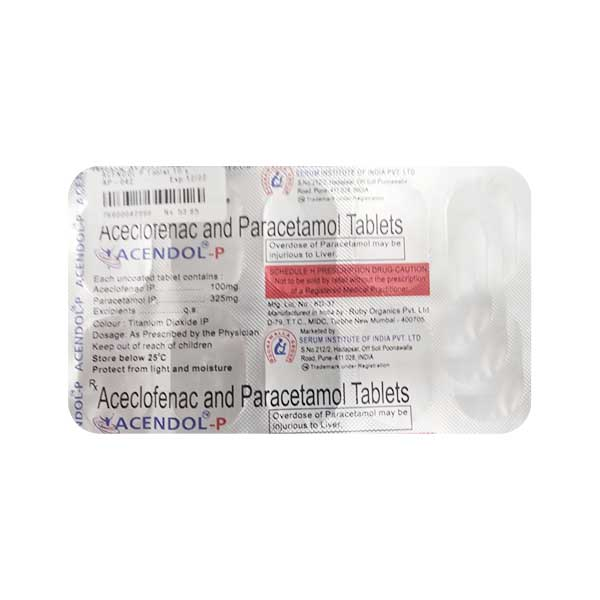-
Introduction:
- Acendol P Tablet is a combination medication that contains two active ingredients: Aceclofenac and Paracetamol. This combination is designed to provide effective pain relief and reduce inflammation.
Acendol P Tablet should be taken with or without food. You should take it regularly as advised by your doctor. Your doctor may change the dose and time between doses according to your pain level and your needs. Do not take more or use it for a longer duration than recommended by your doctor.
Some of the common side effects of this medicine include nausea, vomiting, stomach pain, loss of appetite, heartburn, and diarrhea. If any of these side effects bother you or do not go away with time, you should let your doctor know. Your doctor may help you with ways to reduce or prevent these side effects by prescribing an alternative medicine or adjusting the dose.
Acendol P Tablet may not be suitable for everybody. Before taking it, let your doctor know if you have any problems with your heart, kidneys, liver, or have stomach ulcers. To make sure it is safe for you, let your doctor know about all the other medicines you are taking. Pregnant and breastfeeding mothers should first consult their doctors before using Acendol P Tablet.
-
Benefits:
- Dual Action Pain Relief: Combining Aceclofenac and Paracetamol provides a dual mechanism for pain relief, addressing both inflammation and pain sensation.
- Anti-Inflammatory Action: Aceclofenac is a nonsteroidal anti-inflammatory drug (NSAID) that helps reduce inflammation, making it beneficial for conditions such as arthritis.
- Fever Reduction: Paracetamol is an antipyretic that aids in reducing fever associated with inflammatory conditions.
-
Side Effects:
- Gastrointestinal Issues: Common side effects may include stomach upset, heartburn, and nausea due to the Aceclofenac component.
- Liver Concerns: High doses of Paracetamol may cause liver damage. Regular monitoring of liver function is important.
- Allergic Reactions: Individuals may experience allergic reactions to either Aceclofenac or Paracetamol.
-
Drug Interactions:
- Anticoagulants: Increased risk of bleeding when combined with Aceclofenac.
- Other NSAIDs: Concurrent use of multiple NSAIDs may lead to additive adverse effects.
- Alcohol: Increased risk of liver damage when Paracetamol is combined with alcohol.
- Certain Medications Metabolized by Liver Enzymes: Paracetamol may interact with medications metabolized by liver enzymes.
-
Dosage and Administration:
- The dosage and administration guidelines should be strictly followed as per the healthcare provider’s prescription.
- Typically, Acendol P Tablet is taken orally with or without food.
-
Special Precautions and Warnings:
- Avoid in individuals with a history of gastrointestinal bleeding or ulcers.
- Monitor liver function regularly, especially with prolonged use.
- Caution in individuals with impaired kidney function.
- Use with caution in the elderly population.
-
Advisory:
- Always inform your healthcare provider about your medical history, current medications, and any allergies.
- Do not exceed the recommended dosage to avoid potential side effects.
Acendol P Tablet should only be used under the supervision of a healthcare professional. It’s important to report any unusual or severe side effects promptly and to follow all recommendations provided by the prescribing healthcare provider.
SAFETY ADVICE

Alcohol

Pregnancy

Breast feeding

Driving

Kidney
Use of Acendol P Tablet is not recommended in patients with severe kidney disease.

Liver
However, the use of Acendol P Tablet is not recommended in patients with severe liver disease and active liver disease.
| Weight | 0.5 kg |
|---|---|
| Dimensions | 10 × 10 × 10 cm |


